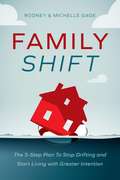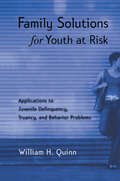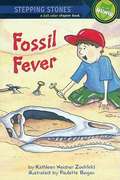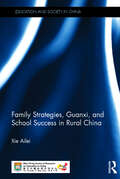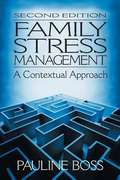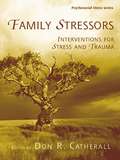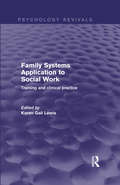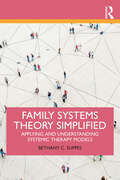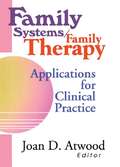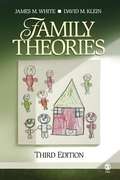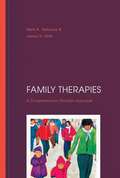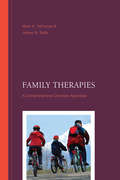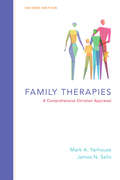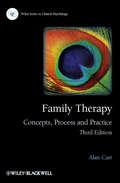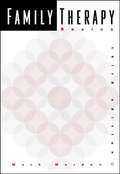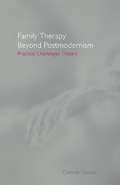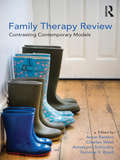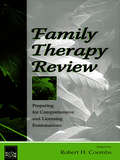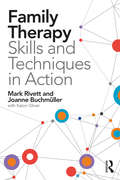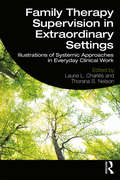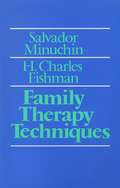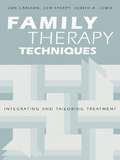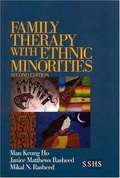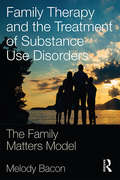- Table View
- List View
Family Shift: The 5-Step Plan to Stop Drifting and Start Living with Greater Intention
by Rodney Gage Michelle GageStop drifting apart and instead thrive together with this practical five-step plan for God's best possible life for your family. Despite the best of intentions, the busyness of life and endless distractions frequently cause parents to put their family's development on the back burner. Family Shift shows parents how to realign their families with easy but critical steps to follow to start living intentionally. Author Rodney Gage and his wife, Michelle, saw a drift start to threaten their own family's well-being and set out to stop it in its tracks. They wanted to defy the alarming statistics of the decline of the family unit and share with families everywhere that they can learn to thrive as a family, not merely survive. Every family gets off track at some point, but that's not a major problem as long as you know your destination. Family Shift has families working together to create a family vision, mission statement, and core values family members will be better equipped to help one another navigate the unexpected twists and turns of life. Each chapter concludes with questions to answer as a family and additional resources to work through together.
Family Solutions for Youth at Risk: Applications to Juvenile Delinquency, Truancy, and Behavior Problems
by William H. QuinnDr. Quinn provides a review on related research and programs and effectiveness. A presentation of the model program provides most of the materials an individual or agency would need to begin to implement the program. A practitioner might take activities from the model program and integrate them into an existing program.
Family Squeeze: Tales of Hope and Hilarity for a Sandwiched Generation
by Phil CallawayYou’ve been warned about middle-age spread. But no one told you about the squeeze. You’re in the “Middle Ages”–sandwiched between the “greatest generation” and the “gimme” generations, busily juggling both with no relief in sight. Children are driving, and parents are not. Money is tight and so are your favorite jeans. And things that never ached before are beginning to give you trouble! For every baby boomer who wonders if it’s possible to navigate the Middle Ages with grace and style, Phil Callaway offers plenty of hope and a little hilarity, too. Because there’s nothing like a smile to make wrinkles less noticeable.The author of Who Put My Life on Fast Forward? and Laughing Matters offers this lighthearted look at the challenges of the middle years — and promises that while we can’t slow down the aging process, we can ease the worries it brings by focusing on what really matters most.
Family Strategies, Guanxi, and School Success in Rural China (Education and Society in China)
by Ailei XieResearch in school success in contemporary China has argued that market reforms have reproduced the advantages for children from the cadre and the professional families while simultaneously creating new opportunities for children of the new arising economic elites. However, it has performed less for traditional peasant families. This book places a special emphasis on how rural parents from different social backgrounds use guanxi (interpersonal social networks) to maintain the interconnectedness between their families and schools to create advantages for their children in school success. It investigates, by an ethnographic study in a rural county in middle China, how families from different social backgrounds within rural society get involved in the schooling of their children and how this contributes to different patterns of school success. The book argues that schools provide few formal and routine channels for rural parents to become involved in their children’s schooling. This raises the importance of family strategic initiatives to employ guanxi in the creation of advantages for their children’s school success. It concludes with discussions about guanxi as an important mechanism for social exclusion in post-socialist China. Chapters include: Family Strategies, Parental Involvement, and School Success The Roles of Parents: Voices of Parents in Zong Regarding School Involvement Policy Discourses: Missing the Link between Family and School Peasants: Family and Kinship The Blurring Division between Home and School This concise and comprehensive book is a qualitative study that will appeal to researchers and advance students in Chinese education and society.
Family Stress Management: A Contextual Approach (Second Edition)
by Pauline BossIn this Second Edition, the author continues to explore both the larger context surrounding families and stress and the inner context, which includes perceptions and meanings. The author emphasizes the need for a more general contextual model of family stress and crises than other models. The goal is to provide a framework for students and professionals engaged in helping families learn how to manage their stress.
Family Stressors: Interventions for Stress and Trauma (Psychosocial Stress Series #No. 29)
by Don CatherallFamily Stressors: Interventions for Stress and Trauma by Don Catherall
Family Systems Application to Social Work: Training and Clinical Practice (Psychology Revivals)
by Karen Gail LewisOriginally published in 1991, this title is a valuable social work text which demonstrated how to apply family system concepts to clinical situations encountered in work with inner-city populations at the time. Unlike traditional theories in clinical social work which were oriented toward the individual, this fascinating book offers a paradigm for social work that encompasses the client, his or her immediate and extended family, the community, the government, and the social worker. The family systems concepts in this refreshing volume are illustrated by case examples addressing the specific issues of AIDS and drug abuse, homelessness, foster care, wife abuse, care of those with intellectual disabilities, and adoption issues. Social workers and social work students can still gain perspective from these insightful chapters and will discover that it is not pathological people that make difficult populations, but difficult life situations that breed pathology.
Family Systems Theory Simplified: Applying and Understanding Systemic Therapy Models
by Bethany C. SuppesIn this textbook for students and instructors of marriage and family therapy, Bethany C. Suppes offers a refreshed perspective of family systems therapy (FST), focusing on the importance of understanding its concepts and demonstrating how models of marriage and family therapy can appear practically in counseling. In Part I, Suppes begins with a theoretical overview of FST, including the history of development, key theorists, and defining core concepts. In Part II, she focuses on application and explores nine key components of FST, identifying how various systemic therapy models apply these concepts. The book also covers the professional responsibilities of the systemic therapist and cultural considerations for those using the theory professionally. Primarily written for those having their first exposure to the ideas of FST, it explains concepts in a language and structure that is more comprehensive and culturally aware than existing literature, aiming to improve the therapeutic process for both therapist and client.
Family Systems/Family Therapy: Applications for Clinical Practice
by Joan D AtwoodUse your family therapy skills to coordinate multidisciplinary teams!This comprehensive book examines family therapy issues in the context of the larger systems of health, law, and education. Family Systems/Family Therapy shows how family therapists can bring their skills to bear on a broad range of problems, both by considering the effects of larger social systems and by cooperating with professionals in other disciplines. Because family therapists are trained to understand how systems operate, they can offer wise guidance whether the dysfunction is occurring within the family system or between the individual and the larger systems of society. The studies and projects reported in Family Systems/Family Therapy demonstrate the ways in which family therapists can help create dialogues of inclusion to develop innovative, effective solution plans. The PEACE project, for example, brings together judges, attorneys, divorcing parents, and therapists to help children deal with the strains of divorce. Family Systems/Family Therapy includes both practical case histories and theoretical considerations. This thought-provoking book suggests areas in which an intersystems approach can be especially effective, including: preventing substance abuse in adolescent girls enhancing awareness of adolescent dating violence managing geriatric care, not just for the identified patient, but for the family as a whole doing court-ordered therapy for divorcing couples working with children labeled as difficult and their teachersFamily Systems/Family Therapy will give family therapists a new vision of what they can achieve when working in the context of individuals, families, or the broader system.
Family Theories (Third Edition)
by James M. White David M. KleinBuilding upon the success of two previous bestselling editions, the Third Edition of Family Theories continues to be the ideal resource for readers wishing to develop an understanding of sophisticated ideas about families and marriages. Authors James White and David Klein have updated and revised each chapter based on readers’ suggestions and on developments in the area of family sociology and family studies. An incisive, thorough introduction to current and traditional theories of the family, this text balances the diversity and richness of a broad scope of scholarly work. New to the Third Edition Starts with a reorganized introductory chapter: The opening chapter has been restructured for increased clarity and to offer a better guide to utilizing theory to guide research and practice. Introduces a new chapter: Previous editions included seven major theoretical frameworks to explain variation in family life. The Third Edition welcomes the addition of an eighth framework on functionalist theory. Includes material on postmodernism: By placing information on postmodernism within the chapter on the feminist framework, the authors allow readers to see more clearly how these two intellectual movements relate to the study of families. Offers updates throughout: Significant additions to the “Variations” section of all chapters have been made to capture new theoretical developments. Restores several meta-theories: Deleted from the last chapter in the previous edition, several meta-theories, dealing with the type of causation, treatment of time, and the level of analysis, have been added back in this new edition. Intended Audience This text is designed for advanced undergraduate and graduate courses such as Family Theories, Family Systems & Theory, and Sociology of the Family in departments of family studies, sociology, and human development
Family Therapies: A Comprehensive Christian Appraisal
by Mark A. Yarhouse James N. SellsChristian therapists doing family therapy have never had a resource to help them navigate the various family therapy theories from a Christian perspective--until now. In this book Mark A. Yarhouse and James N. Sells survey the major approaches to family therapy and treat, within a Christian framework, significant psychotherapeutic issues. The wide array of issues covered includescrisis and traumamarital conflictseparation, divorce and blended familiesindividual psychopathologysubstance abuse and addictionsgender, culture, economic class and racesexual identityCalling for an integrated approach of "responsible eclecticism," they conclude with a vision for Christian family therapy. A landmark work providing critical Christian engagement with existing models of family therapy, this volume was written for those studying counseling, social work, psychology or family therapy. Family Therapies will also serve as an indispensable resource for those in the mental health professions, including counselors, psychologists, family therapists, social workers and pastors.
Family Therapies: A Comprehensive Christian Appraisal (CAPS #5)
by Mark A. Yarhouse James N. SellsChristian therapists doing family therapy have never had a resource to help them navigate the various family therapy theories from a Christian perspective--until now. In this book Mark A. Yarhouse and James N. Sells survey the major approaches to family therapy and treat, within a Christian framework, significant psychotherapeutic issues. The wide array of issues covered includes • crisis and trauma • marital conflict • separation, divorce and blended families • individual psychopathology • substance abuse and addictions • gender, culture, economic class and race • sexual identity Calling for an integrated approach of "responsible eclecticism," they conclude with a vision for Christian family therapy. A landmark work providing critical Christian engagement with existing models of family therapy, this volume was written for those studying counseling, social work, psychology or family therapy. Family Therapies will also serve as an indispensable resource for those in the mental health professions, including counselors, psychologists, family therapists, social workers and pastors.
Family Therapies: A Comprehensive Christian Appraisal (Christian Association for Psychological Studies Books #5)
by Mark A. Yarhouse James N. Sellscrisis and traumamarital conflictseparation, divorce, and blended familiessubstance abuse and addictionsgender, culture, economic class, and racesexual identity
Family Therapy
by Alan CarrNow in its third edition, this highly regarded and well-established textbook includes up-to-date coverage of recent advances in family therapy practice and reviews of latest research, whilst retaining the popular structure and chapter features of previous editions. Presents a unique, integrative approach to the theory and practice of family therapyDistinctive style addresses family behaviour patterns, family belief systems and narratives, and broader contextual factors in problem formation and resolutionShows how the model can be applied to address issues of childhood and adolescence (e.g. conduct problems, drug abuse) and of adulthood (e.g. marital distress, anxiety, depression)Student-friendly features: chapters begin with a chapter plan and conclude with a summary of key points; theoretical chapters include a glossary of new terms; case studies and further reading suggestions are included throughout
Family Therapy Basics (3rd Edition)
by Mark WordenThis text provides readers with the critical link between theory and practice illustrating how to actually do family therapy. It is a primer that takes students step-by-step through the process of conducting family therapy sessions. The book starts with the initial session and finishes with the terminating session covering assessment, diagnosis, skills and techniques needed throughout each stage.
Family Therapy Beyond Postmodernism: Practice Challenges Theory
by Carmel FlaskasPostmodernist ideas are widely used in family therapy. However, it is argued that these ideas have their limits in meeting the richness and complexity of human experience and therapy practice. Family Therapy Beyond Postmodernism examines postmodernism and its expressions in family therapy, raising questions about:* reality and realness* the subjective process of truth* the experience of self.Alongside identifying the difficulties in any sole reliance on narrative and constructionist ideas, this book advocates the value of selected psychoanalytic ideas for family therapy practice, in particular:* attachment and the unconscious* transference, projective identification and understandings of time* psychoanalytic ideas about thinking and containment in the therapeutic relationship.Family Therapy Beyond Postmodernism offers a sustained critical discussion of the possibilities and limits of contemporary family therapy knowledge, and develops a place for psychoanalytic ideas in systemic thinking and practice. It will be of great interest to family therapists, psychotherapists and other mental health professionals.
Family Therapy Glossary
by Craig A. EverettA compilation of core concepts from the field of marriage and family therapy, this quick reference is an invaluable resource for students, new professionals, and educators alike. It is a compact and thorough directory of terms that can be used as an excellent companion piece for those just beginning their study of marriage and family therapy. It is also an excellent study guide for new graduates preparing to take licensure and other comprehensive exams.
Family Therapy Review: Contrasting Contemporary Models
by Charles West Anne Rambo AnnaLynn Schooley Tommie V. BoydThis unique text uses one common case to demonstrate the applications of a wide range of family therapy models. Readers will find it useful when studying for the national family therapy licensing exam, which requires that exam takers be able to apply these models to case vignettes. The authors, all of whom are practicing family therapists, apply their chosen model of family therapy to a single, hypothetical case to highlight what each model looks like in practice. Beginning therapists will find the exposure to new ideas about therapy useful, and will be better able to establish which approaches they want to explore in more depth. Experienced therapists and supervisors will find it useful to understand what “those other family therapists” are doing, and to meet the challenge of supervising those from different perspectives. Family Therapy Review is the practical tool therapists need to make sense of the field, and meet the varied challenges their clients present.
Family Therapy Review: Preparing for Comprehensive and Licensing Examinations
by Robert H. CoombsThis book offers a clear, readable overview of all the knowledge and skills those training as marriage and family therapists and counselors need to pass final degree program, certification or licensing examinations. It is organized into three sections: Basic Clinical Knowledge and Skills, Common Client Problems, and Career Issues. Each chapter includes challenging study questions that enable readers to assess their own level of understanding--15 true/false questions at the outset checking on baseline knowledge, 30 multiple-choice questions interspersed through the text underlining crucial points, and 10 provocative discussion questions at the end facilitating synthesis. Each chapter also provides a glossary of key terms and, in addition to references, annotated suggestions for further reading and Web site exploration. Students and trainees will find Family Therapy Review: Preparing for Comprehensive and Licensing Examinations a resource to which they will go on referring long after it has helped them through their examinations; faculty and established professionals will find it a useful one-stop summary of current thinking about best practice.
Family Therapy Skills and Techniques in Action: Skills And Techniques In Action
by Mark Rivett Joanne BuchmüllerPlease watch the following short video advertisement for the book, featuring the Editors: https://www.youtube.com/watch?v=N1ApHAQIMzQ&feature=youtu.be Relationships are a resource for healing a range of psychological difficulties. This is the fundamental principle of family therapy, an increasingly influential form of psychotherapy that is building up a strong evidence base in a range of psychological problems across the life cycle. Family Therapy Skills and Techniques in Action is both a guide to a variety of family therapy techniques and a review of their history. It provides a thorough explanation of the techniques, explaining their origins and use in contemporary family practice, whilst guiding readers in learning new skills. The authors provide film examples and transcripts of the techniques in action so that readers can develop their skills in a practical way. The book is divided into sections that describe and demonstrate skills such as: Assessing a family; Building a therapeutic relationship with multiple family members; Enactment; Reframing; Using circular questions; ‘Externalising’ the problem; Using family therapy skills in individual work; Understanding and utilising systemic supervision. Family Therapy Skills and Techniques in Action will be an essential practical manual for a range of family therapy skills which can be used in family work by family practitioners from a variety of backgrounds: counsellors, support workers, social workers, psychologists, generic therapists and nurses.
Family Therapy Supervision in Extraordinary Settings: Illustrations of Systemic Approaches in Everyday Clinical Work
by Thorana S. Nelson Laurie L. CharlesFamily Therapy Supervision in Extraordinary Settings showcases the dynamism of systemic family therapy supervision/consultation as it expands beyond typical and historical traditions. In this unique collection, contributors write about their innovations, unexpected learnings, and “perfect accidents” in the context of systemic therapy. These essays highlight creative approaches to supervision, present a wide variety of clinical cases and therapy settings, and demonstrate how training takes place in real time. Each chapter illustrates increasingly diverse settings in which systemic family therapy services are delivered, whether in public mental health care for families across high-, low-, and middle-income countries, in areas of armed conflict or instability due to political violence or war, or stable, liberal democracies with robust public mental health systems. Each setting of supervision is extraordinary in the way it supports family therapy service delivery. Given the wide variation in access to systemic family therapy services, and the diverse settings in which systemic family therapy services are delivered, a set of brief, specific, and lively cases is called for that focus on the dynamic nature of a family therapy supervision and consultation interaction and its influence on clients, trainees, and supervisors. Working as a family therapist in the world today, an era of global mental health, is as full of wonder and challenge as it was in the time family therapy originated as a profession. It is thus no accident that supervision and consultation work is just as extraordinary. This book will be essential reading for family therapy and counseling supervisors, as well as a helpful reference for supervisees.
Family Therapy Techniques
by Salvador Minuchin H. Charles FishmanA master of family therapy, Salvador Minuchin, traces for the first time the minute operations of day-to-day practice. Dr. Minuchin has achieved renown for his theoretical breakthroughs and his success at treatment. Now he explains in close detail those precise and difficult maneuvers that constitute his art. The book thus codifies the method of one of the country's most successful practitioners.
Family Therapy Techniques: Integrating and Tailoring Treatment
by Jon Carlson Judith A. Lewis Len SperryFamily Therapy Techniques briefly reviews the basic theories of marriage and family therapy. It then goes into treatment models designed to facilitate the tailoring of therapy to specific populations and the integration of techniques from what often seems like disparate theories. Based on the assumption that no single approach is the definitive approach for every situation, the book leads students through multiple perspectives. In teaching students to integrate and tailor techniques, this book asks them to take functional methods and approaches from a variety of theoretical approaches, without attempting to reiterate the theoretical issues and research covered in theories courses.
Family Therapy With Ethnic Minorities (Second Edition)
by Mikal N. Rasheed Janice Matthews Rasheed Man Keung HoPraise for First Edtion `There are many good things about the perspective taken in this book. . . an ambitious and creative effort. Provides a starting point on the road to building an alternative therapeutic approach that is sensitive to cultural diversity. It makes an important initial contribution to systemizing knowledge for family therapy so that it is culturally and ethnically specific' - Journal of Marriage and the Family The classic and critically acclaimed book Family Therapy with Ethnic Minorities, Second Edition has now been updated and revised to reflect the various demographic changes that have occurred in the lives of ethnic minority families and the implications of these changes for clinical practice. Family Therapy with Ethnic Minorities provides advanced students and practitioners with the most up-to-date examination yet of the theory, models, and techniques relevant to ethnic minority family functioning and therapy. After an introductory discussion of principles to be considered in practice with ethnic minorities, the authors apply these principles to working with specific ethnic minority groups, namely African Americans, Latinos, Asian/Pacific Americans, and First Nations People. Distinctive cultural values of each ethnic group are explored as well as specific guidelines and suggestions on culturally significant family therapy strategies and skills.
Family Therapy and the Treatment of Substance Use Disorders: The Family Matters Model
by Melody BaconThis accessible guide offers a much-needed integration of family therapy into the treatment of substance use disorders. By proposing a means by which family therapy can be moved to the forefront of addiction treatment, it places the family perspective at the center of its approach and provides a multifaceted alternative to the prevalent individual-focused model. Drawing from Bowen Family Systems Theory and the principles of the 12 step program, the book presents a model of integration that addresses the needs of families struggling with addiction. Illustrated with discussion questions and case narratives of former addicts, the text guides both practitioners and families towards a goal of creating an environment that supports recovery. Offering an overview of the history and current models of addiction treatment, chapters also outline a 6 week Family Matters Program, with accompanying treatment interventions and case studies. The book concludes with an examination of how this program can be implemented by practitioners in a variety of clinical settings. Family Therapy and the Treatment of Substance Use Disorders is essential reading for anyone with an interest in understanding the diverse ways in which addiction affects families. It will be particularly relevant to students of family therapy, but clinicians who work across the fields of substance abuse treatment or family counseling will also benefit from reading this book.
